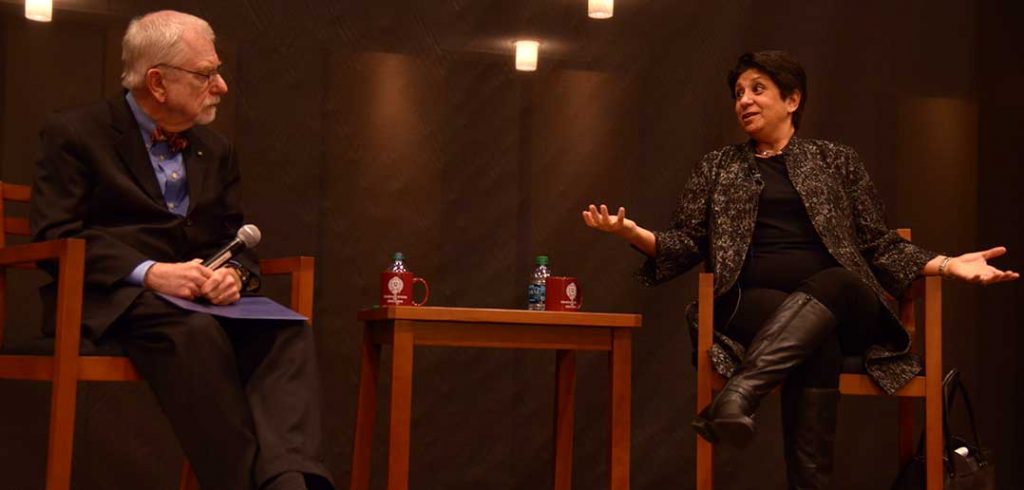There’s more children’s television than ever to choose from today.
Even so, the long-running Sesame Street remains the gold standard for educational television, said Rosemarie Truglio, Ph.D., senior vice president of curriculum and content at Sesame Workshop, because its programming is backed by copious amounts of research.
Truglio spoke at the Lincoln Center campus on Jan. 24 in a wide-ranging conversation with William Baker, Ph.D., the Claudio Acquaviva Chair at the Graduate School of Education (GSE). She said that, behind the scenes, the show—which is aired in 150 countries including Afghanistan—is constantly changing.
Sesame Street is unique among educational shows because of its devotion to a whole child curriculum that addresses all aspects of child development, rather than a single topic like science or literacy, she said. To accomplish those ends, each season is followed by rigorous research that is then shared with the public and incorporated into future programming. In the last 48 years, approximately a thousand studies have been conducted and used to continuously update the show from season-to-season—often to the consternation of parents who were once viewers themselves.
“Parents call and say and ‘Why are you changing my Sesame Street?’ I’m sorry, but that was your Sesame Street. What’s on the air right now is your child’s Sesame Street. So what I want to know is, does your child like watching it?” she said.
Because “appointment viewing” has vanished and more children watch shows on devices like iPads, Truglio said the Workshop’s biggest challenge is helping parents to discern which shows are truly educational, and ideally steer their children to that show.
The show addressed a literacy concern in early childhood education known as the “30 million word gap,” a phenomenon where children from low-income families have been found to enter kindergarten with a vastly smaller vocabulary than middle-class children.
“With vocabulary, you need repetition to really own that word. You also need to see repetition across different contexts. That was nice for us, because we could talk about the vocabulary word at the beginning of the show, have the word of the day with a celebrity, and [have]a character named Murray out on the streets of New York City introducing the word of the day,” Truglio said.
She said that kindergarten teachers have expressed the desire for children to develop “executive function skills,” the ability to listen, be excited about learning, follow directions, and regulate their emotions. To help children develop these skills and understand the difference between impulsive versus reflective behaviors, the Sesame Workshop has taken some bold steps involving the show’s most impulsive character, Cookie Monster.
“When our writers said, ‘we’re going to teach Cookie Monster self-regulation skills,’ I thought ‘Oh my goodness, this is going to be the end of my career,” Truglio joked.
After consulting with renowned psychologist Walter Mischel, they went ahead, she said, because refining self-regulation skills is something we continue to do into adulthood, and there’s no one-size-fits-all strategy. Even Cookie Monster’s inevitable failure to resist eating a cookie is a valuable lesson.
“Mischel told me, ‘I want him to fail because kids need to learn how to persevere. They need to know not to give up. They need to know that if this one strategy doesn’t work, there’s another strategy and yet another strategy,’” she said.
Truglio’s appearance was part of a series of lectures celebrating the GSE’s centennial anniversary.

